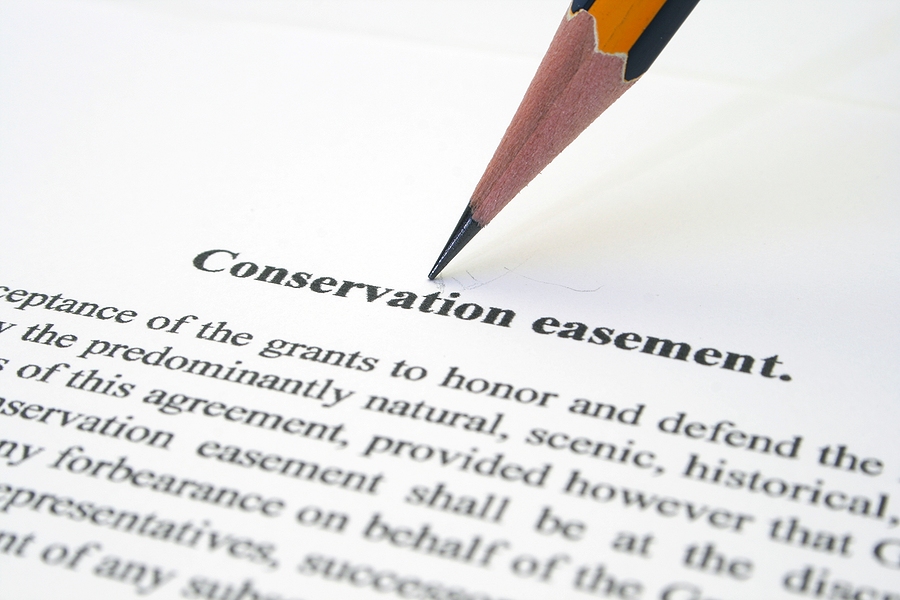
One of the most controversial topics in our tax industry today is conservation easements. Non-profit entities, the Federal government, and some state governments can hold (or purchase, in some cases) the development rights on environmentally important and critical properties. Internal Revenue Code Section 170(h)(1) defines an easement as a “contribution – (A) of a qualified real property interest, (B) to a qualified organization, (C) exclusively for conservation purposes.” To qualify for an easement, Treasury Regulation 1.170A-14(d)(3)(i) states that a property must have a “significant relatively natural habitat in which a fish, wildlife, or plant community, or similar ecosystem lives.” Generally, property owners with a significant natural habitat tend to be farmers and ranchers. Many of these landowners have farmed their properties their whole lives and do not want to see the property be developed. To receive the funds necessary for property improvements or retirement, farmers and ranchers will sell or donate the development rights to the government or a non-profit agency. Sometimes these agencies will purchase the easement. Other times, the landowner donates the conservation easement to an agency or non-profit entity to generate a charitable contribution and reduce their tax burden. As prescribed in Internal Revenue Code Section 170(b)(1)(E), taxpayers are granted a charitable contribution for the difference between the value of the land before the easement and after the easement. The total contribution cannot exceed 50% of the taxpayer’s AGI (or 100% for some ranchers & farmers). Any unused conservation easement charitable contribution can be carried forward fifteen years.
Because of the tax benefits associated with conservation easements, many syndicated investment groups created investment funds focused solely on generating charitable contribution deductions via conservation easements. Unfortunately, many of these syndicated funds were abusive and falsified appraisals to generate larger tax deductions for their investors. These appraisals would drastically overestimate the development potential of the property to create a larger difference in the value of the property before and after the easement. This plan overstated the amount of the charitable contribution for the easement. In response, the IRS decided to start cracking down on these abusive & fraudulent schemes.
In 2019, the IRS added syndicated conservation easements to their ranking of the most fraudulent tax topics. The IRS labeled some syndicated conservation easement transactions as tax avoidance transactions and included them as “listed transactions” in Notice 2017-10. This notice describes syndicated conservation easement transactions in which investors generate charitable contribution deductions in amounts that exceed the amount invested in the fund. This notice continues to explain a scenario in which a promoter creates a pass-through entity that acquires real property and syndicates ownership interests in said entity with the promotion that the investor could be entitled to a return of over 2.5 times their investment. Promoters of these funds achieve this result via a highly exaggerated appraisal which overvalues the potential development opportunities on the property that were sold to the government or non-profit conservation group.
The IRS recently did something they don’t normally do: they offered taxpayers a quick way out. Because of the number of people who knowingly or unknowingly got involved in these investments, the IRS announced a broad settlement offer. The terms of this offer, outlined in the IRS Issue Number 2020-130 which was announced on June 25, 2020, require all partners agreeing to settle and include fully disallowed charitable contribution deduction, pre-settlement payment of tax, penalties, and interest, and investors can deduct their cost of acquiring the partnership interest. As the IRS mentions in their announcement, taxpayers should not expect a better settlement offer even if their cases are reviewed. In the vast majority of the Tax Court’s rulings on syndicated conservation easements, taxpayer investors were not allowed any charitable contribution deduction for conservation easements. The IRS strongly believes the precedents established in these cases are sufficient grounds to entice taxpayers to accept their offer of fully disallowed deductions. Unfortunately, some tax professionals represent clients who were either knowingly or unknowingly involved in syndicated easement programs. Though fact patterns can vary, tax practitioners should present their clients with the settlement offer from the IRS and assist as they see fit. Uncertainty exists as to whether cases not currently with the Tax Court will have the same settlement opportunities.
It is worth noting the IRS also announced their full support for bonafide, legitimate conservation easements. The concept of preserving land for future generations because of the important ecological qualities is hard to argue with. Taxpayers who have clients pursuing legitimate conservation easements should suggest a few best practices to their clients such as: receiving multiple appraisals from qualified professionals, documenting the purpose of the conservation easement, and using numerous experts or environmental groups to outline the “significant natural habitat” found on the property. Depending on the entity acquiring the easement, the significant habitat qualities will be outlined and used to determine funding. For example, the state of Florida’s “Florida Forever” conservation easement program ranks all sites being considered for an easement on their environmental and ecological importance. An application process is required for each property and the state will have the site evaluated to verify the natural habitat claims. Other states and non-governmental conservation groups follow a similar process.
Conservation easements serve an important purpose: to preserve our natural habitat and landscape for future generations. As outlined in IR 2020-130, the IRS will be diligent in enforcing the law and penalizing those syndicated conservation easements which go against the purpose of the program.


